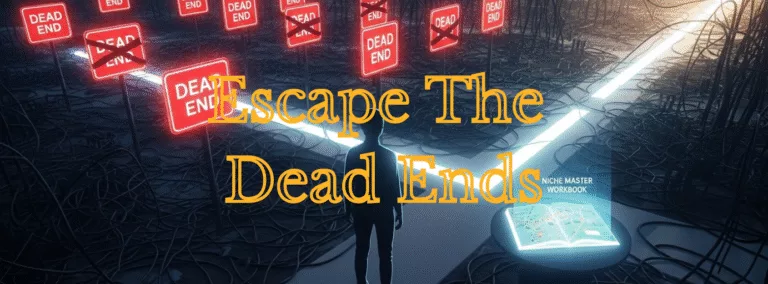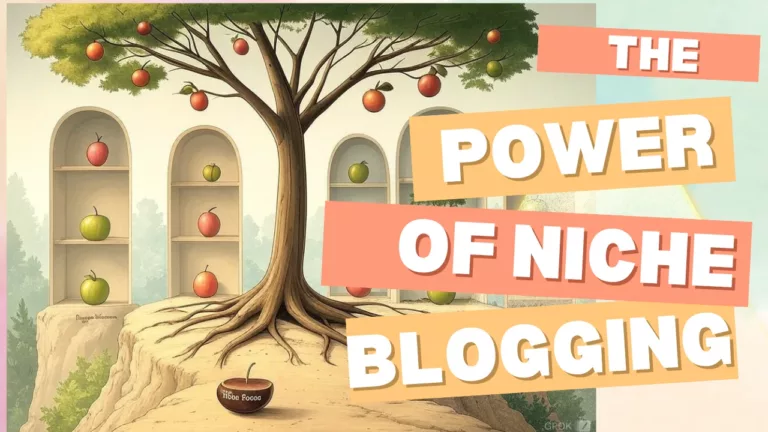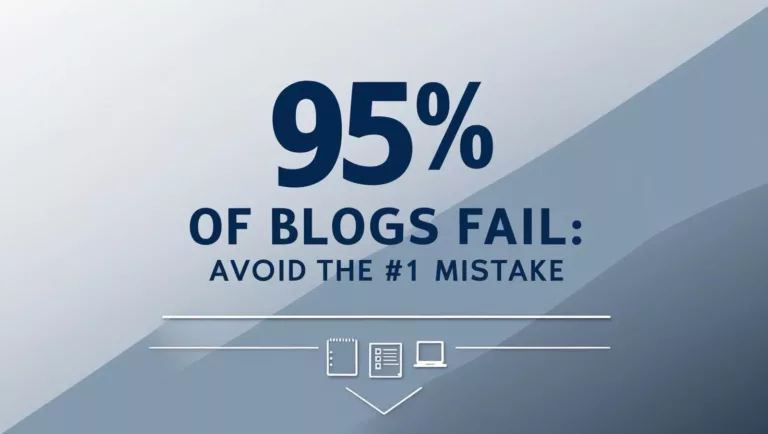Are you writing great content only to hear crickets? Most bloggers fail to launch because they confuse a passing interest with a sustainable, profitable niche. They copy other creators, chase fading trends, and pick topics they can’t possibly master. But the real problem is simple: You’re skipping the crucial discovery phase.
This post reveals the 10 Niche Dead Ends that are burning through your time and energy. More importantly, I’ll walk you through the four practical steps from The Amazing Niche Master Workbook—the exact process I use for all my sites—to find and validate a niche that actually pays.
If you’re ready to stop guessing and start building a platform with real authority, the answers are below.
10 Hidden Dead Ends That Keep Bloggers Stuck
Copying Instead of Clarifying
It’s tempting to mirror a successful blog’s niche, but copying someone else won’t give you a unique voice. You end up second-guessing your every post, and readers notice you’re not all in. The fix is to focus on your own experience, story, or problem you’ve solved.
Skipping Validation
Picking a topic from a list, without checking to see if enough people care about it. I ignored keyword research at first and wrote to a silent audience. A quick search on Google Trends is a good start. Do you use X (formerly Twitter)? Jump over to GROK. Give him this quick prompt –
“My niche is Small Container Gardening. What is trending that I can lend my expertise to?”
Here is what is trending in September 2025, according to GROK
-
- Vertical & upcycled container gardens
- Edible microgreens & strawberries in pots
- Drought-tolerant & native pollinator mixes
- Aquaponics & hydroponic herb setups
- Sustainable fertilizers from kitchen scraps
- DON’T FORGET TO SWAP IN YOUR NICHE!
Chasing Trends, Not Truth
Jumping on new topics just because they’re trending can make it really tough to hold interest over time. Trends come and go, but building topic authority takes steady effort. Pick something you see yourself caring about beyond next week’s headlines. Here is an example of a fading trend – Growing exotic tropical plants like monstera or fiddle-leaf figs in small containers is a fading trend that’s not worth pursuing
For a small container gardening niche, focusing on low-maintenance, high-yield plants like herbs or natives better suits the practical needs of small container gardening, saving time, money, and space.
Picking a Niche You Can’t Sustain
Some topics sound exciting, but require expertise, access, or a lifestyle you just don’t have. For example, running a travel blog if you hardly ever go anywhere. Pick a niche that fits your budget, habits, and available time.
Liking Too Many Things at Once
Having a lot of interests feels great, but trying to write about all of them leaves your readers confused. If you have several different niches, create a separate website for each.
I currently have four active websites:
Setting Points – Master Niche Blogging for Retirement (This one)
Boomer Blogger – A myth-busting site for Baby Boomer Stereotypes.
Web3 Rescued – The time has come for Decentralized Digital Identification (DIDs)
AlchemMyst – A Lifestyle site for the Age of AI
Mistaking Curiosity for Credibility
Being curious about something isn’t the same as having helpful experience to share. Readers trust advice backed by genuine, lived experience. Focus on what you’ve actually tried, failed at, and learned from.
Avoiding Specificity
Vague blog ideas, such as “healthy living” or “making money online,” are too broad to build real authority. Get specific, like “plant-based lunches for busy adults” or “side hustles for retired teachers,” so your audience knows you’re talking to them.
Trying to Help Everyone
Trying to write for everyone ends up connecting with no one. Niche down to serve one type of reader with a clear goal or struggle.
Blogging to Escape, Not to Serve
If you’re focused on escaping a job, boredom, or money stress, readers can sense it. Strong niches come from wanting to help others solve a specific problem, not just getting away from your own frustration.
Skipping the Hard Questions About Yourself
Many of us skip past deep reflection on what matters to us, what stories we’re able to tell, or what skills we truly have. Take time to journal, talk to friends, and figure out your own “why.”

What Actually Makes a Blog Niche Work?
Those were ten reasons why you could be failing. When I look at the blogs that really “work,” a few things stand out. They’re specific, not covering dozens of unrelated topics. They aim to solve a real problem, not just entertain. They also show signs of audience demand, which you can check by doing basic keyword research or scanning Google Trends.
Good niches are connected to something real in your life. Something you’ve been through or care deeply about. This makes content creation much easier because you have more ideas and stories to tell.
A sustainable blog niche can support itself naturally with affiliate marketing, services, or digital products. Good blogging niches naturally find a path to monetization if that is your goal.
What to Do If You Still Can’t Decide
If you’ve read through the “Dead Ends” and you’re still stuck, you’re not alone. The real reason people get stuck is that they skip the discovery phase and jump straight to the busywork.
This is exactly why I created The Amazing Niche Master Workbook—to help you discover your best niche before you waste any time writing to a silent audience.
Before you commit to a topic, you need to give it a proper “test drive.” You wouldn’t buy a car without sitting in the driver’s seat, and the same principle applies to your niche.
To make this easy, start by taking advantage of a resource like Wealthy Affiliate, where you can register for free—no credit card needed—and immediately gain access to a website, training, and services.
Now, put your uncovered niche through these four practical trials:
- The “5-Post Test Drive”: Write five complete posts on your potential topic. This will quickly reveal if you genuinely enjoy writing about it and if you have enough initial ideas.
- Map Out a 30-Day Topic Outline: Use the Wealthy Affiliate Hub to create a complete mind map. with a multitude of post ideas. As you browse through this list, imagine writing about them. If the ideas pique your interest, give them a start. If it doesn’t, return to the workbook and use the next niche.
- Use Google Trends and Keyword Research: Once you have a few ideas, plug them into tools like Google Trends, Ubersuggest, or even a basic Google search to see if there is real public demand for the information. But be careful. Look at the top of the list. If you see the “Titans of Industry” at the top, dig deeper into your niche. You will never outrank Johns Hopkins in a health-related niche.
- Journal Through Your Experience: Don’t forget your personal life! Write about challenges you’ve overcome or daily lessons you’ve learned. These authentic stories can be transformed into great posts, helping you clarify your true mission and voice.
Can You Blend Niches?
When I help someone brainstorm, I always use a systematic framework to map their core assets. You cannot survive on passion alone; you are here to make money, and a strong niche must be built on something the market will pay for.
To begin that process, I always start with a deep dive into these four core questions. They cover all of your monetizable assets:
The Niche Brainstorming Quadrant
- When you are not at work, what do you do in your spare time?
- What skills do you have from your Just Over Broke (JOB) that you can leverage?
- What are your hobbies, your “pay for play” distractions?
- What life-changing experiences do you have?
I find that this covers just about everything that could be a valuable and sustainable niche for you
Real Examples of Strong Niche Focus
- Blogging for Retirement: I thank you for being here. When I created Setting Points, my idea was a resource hub for retirees who want to start online businesses or share retirement stories.
- Plant-based Recipes for Busy Singles: One blogger I know created a meal plan blog focused just on single professionals with little cooking time. This specificity attracted a loyal following because she solved a very real, daily problem.
- Digital ID for Nontechnical Users: In case you have seen Web3 Rescued, turned his experience helping people find their way through online identity and security into a blog targeting older adults who often feel left out by standard tech blogs.
- Urban Homesteading After 50: Documenting the transition to growing food in a small city yard, this niche taps into two communities: urban dwellers and older adults seeking self-sufficiency.
- Baby Boomer TruthTelling Blog: The Boomer Blogger shares advice and lessons from decades of living. This blog speaks specifically to Boomers wanting connection and meaning. I call out my audience in every post, building trust and getting real engagement.
You’re Not Behind, You’re Ahead
If you’re struggling to choose your direction, that simply means you care about getting this right. Confusion is actually a sign you’re thinking carefully, not making a snap decision you’ll regret down the road. By taking time now, you’re saving yourself years of frustration. In the end, you’re not only picking a niche, but building a platform for the people you genuinely want to help. That’s a win, even before you hit publish.









It’s fascinating how easily one can fall into a niche dead end without realizing it. The discussion raises an interesting point about when to pivot versus when to double down. How can a creator accurately recognize that a niche is truly “dead” rather than just temporarily stagnant? I’m also curious about your thoughts on balancing passion with profitability – should someone leave a niche they love simply because the audience seems too limited?
It is easy to get lured in by shiny trends or copycat ideas, thinking they’ll magically pay off. The majority of times, they do not; they fizzle out.. Sometimes people pick niches they can’t sustain. It was too broad, no expertise, or had no time. Imagine chasing exotic plant crazes when we’ve never touched dirt.
Other times, it’s passion without proof; we love it, but the audience doesn’t care, or worse, it’s too small to monetize. It happens. But if it falls into the You Do You category, there will be a way to expand your niche into what people are looking for. Healthy Desserts versus Banana Tacos.
Of course, skipping validation is unforgivable. Ignoring Google Trends or a quick Grok prompt means we’re shouting into the void. And when we avoid the tough self-check, what skills, stories, or problems can we actually solve? The dead ends crop even faster. That’s why the 4-Step Map from the workbook is a lifesaver. It forces us to test and tweak before we’re stuck.
What dead end tripped you up?
Spill it below,
#BoomerWisdom style!
“10 Hidden Dead Ends That Keep Bloggers Stuck” really hit home for me especially the point about skipping validation. It’s easy to fall in love with a niche idea and dive in headfirst, but without confirming demand, you risk building a blog no one’s searching for. I appreciated the reminder to use tools like Google Trends and Ubersuggest before committing. It was also refreshing to see how copying others and chasing trends can actually drain creativity instead of building momentum. The practical tone throughout makes this feel less like advice and more like mentorship. How long should someone stick with a niche test (like the 5-post test drive) before pivoting if there’s little engagement?
You know, Ravin, this has been a popular question. How long should I stay with my niche? I like to turn this back around to you. The first question is the niche that you chose; was it based on “You Doing You”? In other words, is it something that you can talk ad nauseam about? Can you teach me something about your nice? Are people looking for what you are teaching?
I currently operate 6 websites. Each has a specific niche. Here, I teach “How to Master Niche Blogging”. I have been online for well over 30 years. This is me doing me.
Now, if your niche is not a part of you, is it really your niche?
If your niche is not a part of you, it will not succeed. People spot AI-created and pass you by.
If your niche is a part of you, then the question is anyone looking for your solution? If not, you need to reframe the solution. This is my Banana Taco analogy. They are delicious, I love them, and really want to promote them. But how many people out there are actually looking for Banana Tacos?
No one.
But if I wanted to sell Banana Tacos, I would have to promote “Healthy Desserts”. That is a term that people are looking for. When they find my site, they will find my Banana Tacos. The curiosity will lure them in, and I will have a sale.
So, how long should you stay with your niche? Any niche can be profitable with the right research and lived-in experience. Today, AI will eat anything, including my Banana Tacos that aren’t real.
I do niche selection and website reviews.
MrDon
The Amazing Niche Master
What a fantastic read, Don. This really hit home for me. I like how you broke down the “dead ends” so clearly; it’s easy to see how many of us fall into those traps when we’re just eager to get started. Your reminder about the discovery phase really stood out. It’s something I’ve learned (sometimes the hard way) that you just can’t skip if you want a blog that truly lasts. The examples you shared, especially about connecting your niche to real-life experience, were spot on. It’s refreshing to see such a grounded and practical take on a topic that often gets overcomplicated.
I’m curious. Out of all the “dead ends,” which one do you think trips up most new bloggers today?
Thank you so much for your thoughtful comment and honest reflection. In my experience, the “dead end” that trips up most new bloggers is skipping the discovery phase and jumping straight into content creation. When you skip the validation phase and go with the niche that fits your life and interests, many people find that there’s no real demand out there. That is when they hit this dead end. It’s easy to get caught up in initial enthusiasm, or to pick something just because it looks profitable or trendy, only to burn out when the topic starts to feel forced or irrelevant.
Taking the time for discovery and testing a handful of posts, mapping out ideas, and connecting with personal experience makes a huge difference. It keeps content authentic and sustainable, and it’s honestly the best insurance against losing steam six months in.
Connecting your niche to something you’ve lived makes everything more natural: writing, engaging with readers, and even monetization down the line. That’s a lesson I had to learn the hard way. The reitement crisis is real, but not that many people were looking for The Gray Apocalypse. So I had to shift the focus. The niche is correct, but the angle was wrong. I hope you enjoyed the rest of my posts as well. Thanks again for joining the conversation. Your insight is exactly what helps keep these discussions real and helpful for everyone.
Hello Don!
Thanks for shining a light on why they happen (oversaturation, following trends, choosing niches without enough passion or demand) and how we can avoid them — it’s helpful, especially coming from someone balancing business with family. I especially liked how the article reminds you that just because a niche looks “hot” doesn’t mean it fits you or will last. It pushed me to question whether I’m picking topics based on what’s trendy vs. what I care about and can stick with long-term.
Here are a couple of questions I’m pondering: how do you decide when to abandon a niche because it’s just not working versus when to tweak it and give it more time? And do you have a favorite way to test niches without investing a ton (time, money, content) up front?
Overall, this was encouraging — it makes me feel more confident about picking a niche more carefully and not rushing into something that leads nowhere.
Angela M 🙂
Angela, Thanks for your comment and questions.
Let me answer the easy question first. How do I test ideas? GROK is my trend watcher, and Twitter is my idea oven. I get trends from one and do my research on the other. If I can create a buzz, I know that topic will be a relevant as a post. If you think it could be a niche, go one step further. Look at Answer the Public, or Google Trends. If it is there, could it be a category ot a new website?
AS to the harder question…
There’s no one-size-fits-all answer to when you should tweak or give up, but there are a few questions worth asking before you turn left or pull the plug.
Here’s what I’d look at:
Why did you choose this niche?
What motivated you? Did it come from a You Do You self-exam or just a list of “hot” topics?
What are your keywords?
Who’s ranking at the top, and what are they doing differently?
What problem are you solving?
What’s your unique solution or angle that separates you from everyone else?
What other solutions exist?
Knowing what’s already out there helps you spot the gaps where your voice truly matters.
Working through these questions usually reveals the real answers you’re looking for.
I share this prompt often as a self-assessment tool — just tailor it to your own niche, ICA, and solution:
“I’m a blogger writing about Niche Blogging for Retirement Income. My ICA is people over 50 without retirement income. My solution is Wealthy Affiliate. What problems can I solve with my solution? Is there a better solution I haven’t considered yet?”
We’re living in the Age of AI — use it as your research partner, not your replacement.
Leverage it for insight, direction, and creative momentum.
And if you’d like a comprehensive website review, I offer that too.
– MrDon
This article really hits home for anyone who’s ever felt stuck trying to find the “right” niche. I love how you broke down the common traps—especially confusing curiosity with credibility and chasing trends instead of building long-term authority. The 4-step map feels like a clear, actionable way to finally move forward with purpose instead of guesswork. It made me stop and think—when you’re testing out a new niche, how long do you usually give it before deciding if it’s truly worth pursuing or pivoting to something else?
Jenny, thanks for the comments. The Amazing Niche Master process that I created does a great job of Niche Selection simplification. Half of the battle is getting niche selection correct from the outset.
How long do I give my ideas? My timeline is extended due to my 5 am – 5 pm Just Over Broke (JOB). I have a tendency to let ideas simmer longer than most. When niche writing is all about You Doing You, there really is no wrong niche. If it is not working, your approach may be wrong. I use the idea of Banana Tacos all the time. They are delicious, and I enjoy them. But no one is searching for them. People do search for healthy foods. So I would write about Healthy foods and slide my banana tacos in. Square peg, round hole.
I do have 6 websites currently running. One of them was sent to the back burner. FlexMeOutdoors.com.
I was a work-from-home person for a while and had a dream of upgrading my deck into a beautiful office area. Then COVID ended, and most people were forced back to the office. I lost most of my traffic. Had the government let people stay home, this may have had more life. I left it as a trend niche that had passed its time. This took about six months. It was my third niche, behind Setting Points and Digital Identification, Web3Rescued.com
The key to success or pivoting goes back to your why. Why did you start in your current niche? What problem were you trying to solve? Are people looking for a solution?
If you are having second thoughts about your niche, let ChatGPT play Devil’s Advocate. Give it a prompt like this (replace the niche and Ideal Customer Avatar, and solution) with your info.
“I am a blogger writing about Niche Blogging for Retirement Income. My ICA is people over 50 without retirement income. My solution is Wealthy Affiliate. What problems can I solve with my solution? Is there a better solution that I may not have thought about?”
I couldn’t help myself. I just ran that prompt through Perplexity, Copilot, and ChatGPT. I now have 5 more topics to write about, and a new lead magnet!
We’re in the Age of AI.
Leverage it for all its worth. Let me know what you discover.
And if you’d like a comprehensive website review, I offer that too.
– MrDon